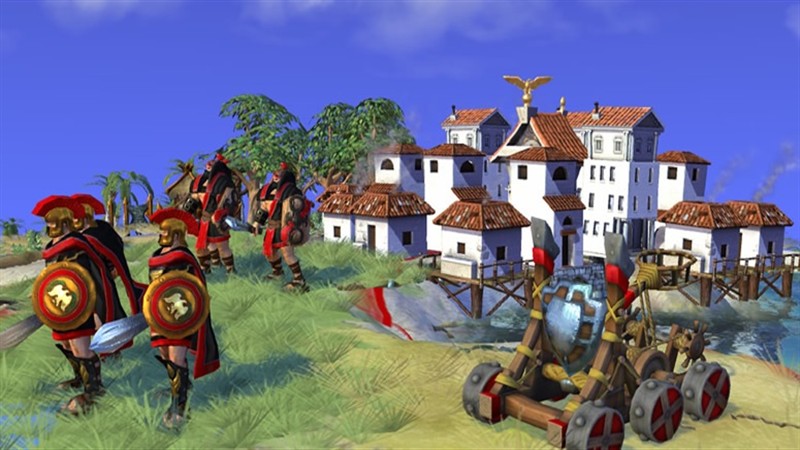Civilization Revolution isn’t for the faint hearted, because if you know your history, then you’ll be aware that warfare has played a major part in the advancement and detriment of the human race. The game places the player into a godlike diplomatic role, where by managing resources, developing technology and being aggressive are keys to victory. You get to choose from the major countries in the World today, and with each having their own bonuses, war and peace has a new meaning in this game.
Gameplay:
The idea in this game and like many other strategy games, is to become victorious under certain conditions. Civilization presents four unique ways in which victory can be yours, and these include, winning by destroying your enemies by force, winning by having more money than anyone else, winning by being the first to reach the next solar system, and finally winning by having a cultural dominance over your adversaries. The way in which you accomplish these goals is reasonably straight forward, but to be honest the game does require a bit of practice and understanding before you can make your own personal mark on history. There are several modes of play and as mentioned you’ve got the choice in how you win (each requiring a different approach). The main game is where you get to choose a race such as the French, Americans or English and strive for dominance in one of the four areas. It’s a race from start to finish, but the kind of race that most certainly requires some methodical thinking and planning if you are to be successful. The other mode offers various scenarios which present fixed conditions, thus making the basic game a little more dynamic, offering something more to mess around with once you’ve mastered the game. There are several levels of difficulty to choose from, with the easiest being a good place to get to grips with the whole interface system, which can be a little daunting at first. Luckily the easy setting provides an on going tutorial which explains the basics of what everything does and comes in quite handy if you’re not inclined to sit through tons of text in the built in encyclopedia; although you will miss out on some details that could prove useful as you become more advanced at playing if you don’t take the time to wisen up on the details.
The game begins on a random terrain that’s filled with features such as deserts, fertile land, rivers, mountains and seas. The first task is to settle an area and start gathering resources so that you can expand your empire. Once a settlement has been constructed (a simple press of the Y button with the “settlers” unit), although and you’re ready to start building basic units. At the early stages of the game, you’ve got to manage your approach wisely, because not only are there lots of temptations on offer, but the option to do as you please is prevalent from the offset; with this potentially leading to distractions that may or may not benefit your race. Early on you have to decide whether you’ll start attacking the other races that are also vying for supremacy, or deciding for a more peaceful approach. I found it to be very dynamic, in that war can lead to conquering other settlements, but at the same time takes a heavy toll on resources. Being locked in a war with one or more nations might allow another race to get a non violent victory, whilst you are focusing on attacking and defending. You are able to make new settlements in most areas, but as with all games of this type, you have to wait until units can be built before using them. Unlike some other strategy games, Civilization is turn based, which in a sense gives you some breathing space to plan your strategies more effectively.
What is neat is the fact that as time advances and as you choose which technologies to learn, your units become more and more advanced. So beginning with simple archers or soldiers with swords, who can only move so far per turn you will eventually end up with tanks, aircraft and even nuclear weapons if you develop the right technologies. The game offers an easy to use development tree, which shows you what you can gain from developing specific technologies, with better technologies having a requirement before you can unlock them. It’s pretty easy to understand if you take the time to look at the development tree, although you can decide to just go with your instincts at first.
The real trick to success is management of your resources and developing your own strategy that suits what’s happening around you. I found there’s no real right and wrong way to play, but careful choosing of your race at the game’s start can have a big impact. Each race is given a unique bonus to start you off, and on the tougher settings this can be crucial. As you build more stuff in your settlements, each building type develops one of the four areas, so for example a barracks is going to improve your military units, whereas a bank will increase the amount of gold you can harvest. The choice is most certainly yours, even down to how your population conducts itself in terms of society rules and whether you are going to be peaceful with your neighbors or not. Like I said, it can be quite daunting at first, but once you’ve devoted some time to playing, and suffered some losses or gained victories, you’ll find that it’s all pretty straight forward.
I think the real reward comes around the half way point of a game, where you realize that something you are doing is right, and allows you to gain a distinct edge over your enemies. An example of this is being the first to learn mathematics, which in turn enables you to build catapult units. As an early unit to build, I found that being first to develop these, most certainly gives you a military edge. Towards the latter parts of a game, turns become more complex as more units need to be moved or set to defend areas; and with lots of cities on the map you really have to make sure that each is doing the best it can for your cause. I had great fun nuking Berlin in one game, although surprisingly this action didn’t win me the game. In another game the same stunt failed against the Chinese, as they were more technologically advanced than I was and had built nuke defences to counter any intercontinental attacks. There seems to be a lot of mathematical equations behind a lot of the actions in the game, and to a degree you’ll sometimes be left scratching your head when your army of tanks gets defeated by 17th Century riflemen or cannons. Luckily you are able to prepare yourself by either saving frequently or using the in game tools such as spies and such like to avoid getting beaten too often. I did find that there’s somewhat of a random element to combat, and so even if the stats say you should win a fight, it’s not always going to be a dead cert. I found that you really need to overwhelm your opponents in either of the four areas to stand a chance of great victory.
Graphics:
Civilization adopts a cartoon style approach to the graphics, and so those of you expecting realism might be a little disappointed. However the colourful graphical style does provide an exaggerated look which has its own appeal. Obviously you can easily tell what each of the units are, and everything is glossed over in an abundance of colour to make life and death a little more lighthearted. You’ll see various animations of buildings being built and units fighting each other, and like the other sim style games, there’s a real sense of a living breathing world which develops and grows before you.
The game’s presentation is very good and throughout the course of play, you’ll receive updates from your advisers who pop up on the screen to give you their advice, as well as the leaders of other nations who will try and trade with you or announce war. These people are amusing and well animated. It’s also neat to see your advisers change outfits as you progress through time.
The control interface is pretty fluid and offers a workable layout that’s as good as you’ll get on a controller. I found there to be no real issues with the game graphically, as everything runs very smoothly as you would expect, it being a turn based game. The game hides inactive units which means the screen isn’t littered with lots of confusion.
Audio:
The sound is pretty standard fare and presents nothing that’s going to stand out too much, or distract you from the task at hand. You’ll hear the sound of buildings and of course various sound effects which inform you of what’s happening around your world. There’s not much speech either, bar the mutterings of your advisers (who speak gibberish) and your enemies allies. The only other sound effects you are going to hear often is the sound of units attacking each other. There is no in game music other than in the menu screens.
Longevity:
Civilization Revolution is a game that can potentially last you a very long time indeed, because not only do all of the leaders you choose at the start of the game have different abilities (which can change your tactics); but also there’s the replay value of simply trying out new ways to beat your opponents. What’s more, if you tire of playing alone, then there are also leaderboards to compete with as well as other players over Xbox Live. You are also able to set up system link games if Live isn’t an option. The game’s achievements for the most part aren’t too hard to unlock, although some of them can take quite some time to accomplish, especially as games can last quite some time depending on the difficulty selected and your playing style.
Overall:
If you like strategy games and playing god, then I can fully recommend this game as it offers hours of strategic entertainment. However, for those of you with less patience, then I will say that there’s quite a steep learning curve compared to more accessible games. The game may lack the semi realistic graphics and high production values seen in some RTS games, but I found the cartoon approach to be charming and offering it’s own take on the genre. The slow pace also works in the game’s favour, as planning moves in a turn based manner, feels like you have more control all the time, rather than having unknowns suddenly appear from out of the blue and take you out of the equation. Civilization Revolution isn’t a game for everyone, but for gamers looking for something different from the norm, then I would highly recommend this title. Although be warned, it’s not a quick fix game as you can get sucked in for hours as you strive to conquer all.
8/10




